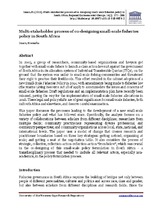| dc.contributor.author | Isaacs, Moenieba | |
| dc.date.accessioned | 2016-10-19T11:52:50Z | |
| dc.date.available | 2016-10-19T11:52:50Z | |
| dc.date.issued | 2016 | |
| dc.identifier.citation | Isaacs, M. (2016). Multi-stakeholder process of co-designing small-scale fisheries policy in South Africa. Regional Environmental Change. 16(2): 277-288 | en_US |
| dc.identifier.issn | 1436-3798 | |
| dc.identifier.uri | http://hdl.handle.net/10566/2452 | |
| dc.identifier.uri | http://dx.doi.org/10.1007/s10113-015-0874-2 | |
| dc.description.abstract | In 2005, a group of researchers, community-based organizations and lawyers got together with small-scale fishers to launch a class action law suit against the government of South Africa in its allocation system of Individual Transferable Quotas, on the ground that the system was unfair to small-scale fishing communities and threatened their right to practise their livelihoods. This effort resulted in the cabinet adoption of a new small-scale fisheries policy in 2014, with amendments being made to fisheries law (the Marine Living Resource Act 18 of 1998) to accommodate the issues and concerns of small-scale fisheries. Draft regulations and an implementation plan have recently been released, paving the way for the implementation of small-scale fisheries allocations in 2016. These legal and policy shifts are of great significance for small-scale fisheries, both in South Africa and elsewhere, and deserve careful examination. This paper discusses the processes leading to the development of a new small-scale fisheries policy and what has followed since. Specifically, the analysis focuses on a variety of collaborations between scholars from different disciplines; researchers from multiple fields; community practitioners representing diverse professional and community perspectives; and community organizations across local, state, national and international levels. The paper uses a model of change that crosses research and practitioner boundaries based on three key strategies: getting noticed; organizing at scale; and getting a seat at the negotiation table. It also considers the “transdisciplinary” process of involving all relevant actors in strategic, collective, reflection–action–reflection–action “from below”, which was crucial in the co-designing of this small-scale policy formulation in South Africa. | en_US |
| dc.language.iso | en | en_US |
| dc.publisher | Springer Verlag | en_US |
| dc.rights | This is the author version of the published article which is available online at http://dx.doi.org/10.1007/s10113-015-0874-2. | |
| dc.source.uri | http://dx.doi.org/10.1007/s10113-015-0874-2 | |
| dc.subject | Co-designing geography | en_US |
| dc.subject | Climate change | en_US |
| dc.subject | Nature conservation | en_US |
| dc.subject | Oceanography | en_US |
| dc.subject | Participatory action research | en_US |
| dc.subject | Small-scale fisheries | en_US |
| dc.subject | Transdisciplinary | en_US |
| dc.subject | Individual Transferable Quotas (ITQs) | en_US |
| dc.subject | Marine Living Resource Act 18 of 1998 | en_US |
| dc.subject | South Africa | en_US |
| dc.title | Multi-stakeholder process of co-designing small-scale fisheries policy in South Africa. | en_US |
| dc.type | Article | en_US |

